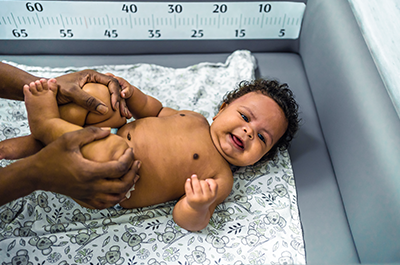Asthma is the most common chronic condition in children, affecting 8.4 percent of people under age 18 in America. Beyond the coughing, wheezing and difficulty breathing, children with asthma face an increased risk of developing other chronic conditions, and have a higher risk of death.
“Kids can develop asthma at any age,” explains Bridget McArdle, D.O., a pediatrician at Henry Ford Health. “Risk factors include a family history — meaning someone else in their immediate family has asthma — being born prematurely and exposure to allergens such as mold, pet dander and other environmental allergens.”
Exclusive breastfeeding for the first six months of life – and maintaining a clean, smoke- and allergy-free environment – can help protect kids against asthma. But even taking those steps doesn’t guarantee a child won’t develop the condition.
Asthma Triggers to Avoid
Asthma inflames kids’ airways and can interfere with their quality of life, impacting everything from play to sleep. And it can’t be cured, so avoiding things that trigger it is critical for helping you and your child control symptoms and prevent damage to growing lungs.
Here are some common asthma triggers – and what you can do about them:
- Allergens. Environmental allergens are a key trigger for asthma. In fact, according to the American Academy of Pediatrics, most children who have asthma also have allergies. The primary culprits: house dust mites, pet dander, cockroaches and pollens.
What to do: If your child has allergies that trigger asthma, treat the allergies, says Dr. McArdle. If your child is allergic to pollen, for example, start their allergy medication before the flowers start blooming. Similarly, if you know your child is allergic to dust mites, use a high-efficiency particulate air (HEPA) filter, cover your child’s mattress and pillows with allergy-proof coverings and wash their bedding in hot water every week. - Mold. Mold commonly results from excess moisture indoors. Water damage, leaky pipes and roofs or excessive humidity can all cause mold to grow in homes.
What to do: Prevent mold from taking hold by controlling indoor humidity, repairing any sources of water leakage and using a dehumidifier in areas with high humidity (like bathrooms). You may also want to test your home for mold spores and remediate any existing contamination. - Air pollutants. Exposure to environmental toxins, pollution, pesticides and cigarette smoke during infancy is a strong risk factor for developing childhood asthma. Cigarette smoke, in particular, is notorious for triggering childhood asthma attacks.
What to do: Do not smoke – and don’t let anyone else smoke – in your home or in your car. - Respiratory infections. Viral infections of the nose and throat, as well as sinus infections, pneumonia and the flu can worsen asthma symptoms and trigger an attack.
What to do: Bolster your child’s immune system with a healthy diet including lots of fruits and veggies, daily exercise and plenty of sleep. Since children with asthma are at higher risk of developing complications from the flu, make sure your child gets an annual flu shot. And encourage kids to wash their hands frequently to help prevent the spread of infection. - Weather changes. Cold, dry air can cause kids with asthma to develop wheezing, coughing, and a tight feeling in the chest, especially when they’re physically active.
What to do: Dress children in layers and cover their throats and mouths with a scarf when they’re outdoors in cold temperatures. Keep your child indoors – and use asthma control medications – when air quality is poor due to pollutants or other factors.
“If you notice your child wheezing, coughing or short of breath, visit a doctor to rule out asthma,” says Dr. McArdle. “If your child has already been diagnosed with asthma, follow up with his or her doctor at least every six months to make sure the condition is under control.”
To find a pediatrician at Henry Ford or make an appointment, visit henryford.com or call 1-800-HENRYFORD (436-7936).
Dr. Bridget McArdle is a pediatrician who sees patients at Henry Ford Medical Center – Sterling Heights.



